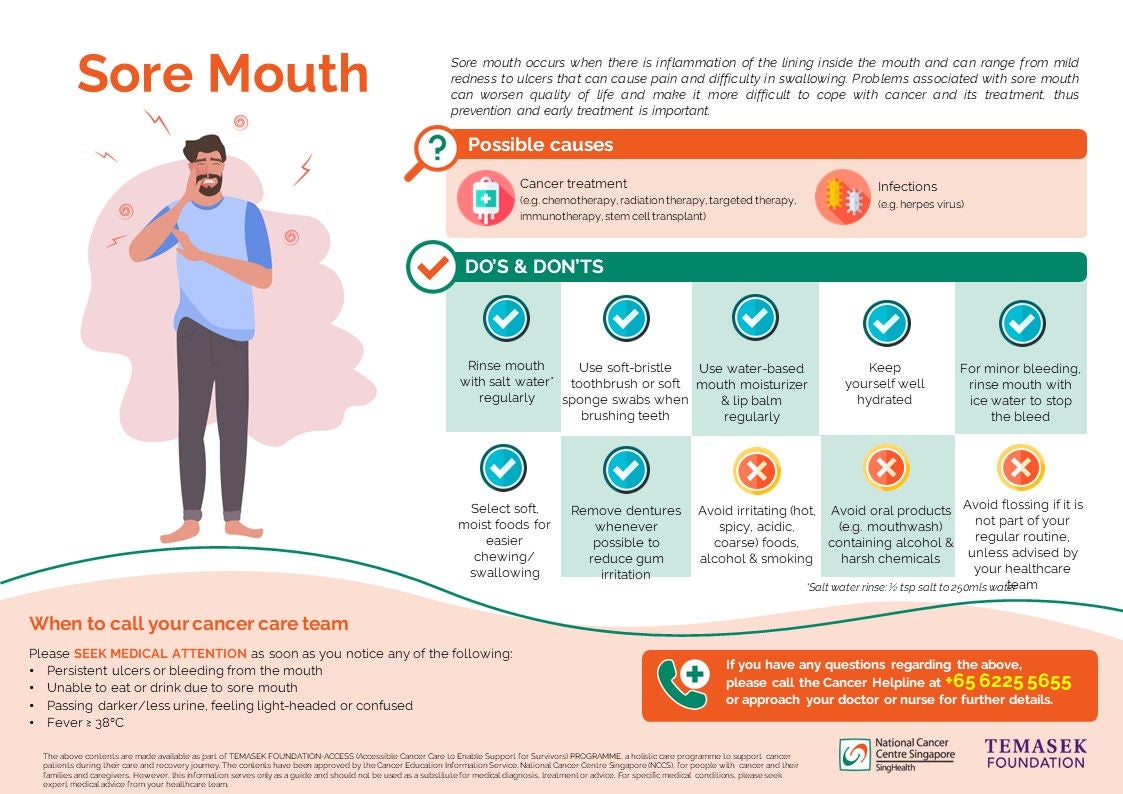National Cancer Centre Singapore will NEVER ask you to transfer money over a call. If in doubt, call the 24/7 ScamShield helpline at 1799, or visit the ScamShield website at www.scamshield.gov.sg.
Sore Mouth (Oral Mucositis)
- Allergies
- Appetite Loss
- Bone Problems
- Breathing Problems
- Constipation
- Diarrhoea
- Difficulty Swallowing (Dysphagia)
- Dry Mouth (Xerostomia)
- Difficulty Sleeping (Insomnia)
- Feeling Tired (Fatigue)
- Fevers and Infections
- Hair Loss
- Heart Problems
- Menopausal Symptoms
- Indigestion
- Joint Pains
- Limb Swelling (Lymphedema)
- Muscle Aches
- Nail Changes
- Nausea and Vomiting
- Pain
- Tingling or Numbness in Hands or Feet (Peripheral Neuropathy)
- Skin Changes
- Sore Mouth (Oral Mucositis)
- Taste Changes

Sore mouth, or oral mucositis, occurs when there is inflammation of the lining of the mouth, and can range from just redness in the mouth and/or gums to severe ulcerations that can cause pain and difficulties in eating, swallowing and speech. Problems associated with sore mouth can have a negative impact on a person’s quality of life, and the best way to manage them is to prevent or treat them early.
Causes of Sore Mouth
The lining of our entire gastrointestinal tract (including our mouth, throat, stomach and intestines), also called the “mucosa”, is made up of cells which divide and grow rapidly. Chemotherapy and radiation therapy kills not only cancer cells, but also other rapidly dividing cells - and this includes the mucosa of the whole gastrointestinal tract. Cancer and cancer treatment-related causes of sore mouth therefore include:
- Chemotherapy. Over 40% of people receiving chemotherapy will develop some degree of sore mouth during their treatment, and this usually occurs when the white blood cell count is low. People receiving certain chemotherapeutic drugs (e.g. methotrexate, 5-fluorouracil, doxorubicin, vincristine, etc.) are more likely to developing sore mouth than others.
- Radiation therapy. People receiving radiation to the salivary glands, head and neck region, or total body irradiation are more likely to develop sore mouth.
- Graft-versus-Host disease. This is a process that can happen after a bone marrow or stem cell transplant, where the donor cells recognize the recipient’s cells as foreign, and mount an attack against them. This can occur in any part of the body, including the mouth.
- Infections. Mouth sores cause by infections e.g. herpes virus can be more common in people with cancer.
There are other factors that can increase your likelihood of developing sore mouth. These include: poor oral health, smoking, drinking alcohol, dehydration, taking medications that causes dry mouth (e.g. antidepressants) or that predisposes you to mouth infection (e.g. corticosteroids), and certain diseases (e.g. kidney disease, diabetes).
What you need to look out for
Depending on the cause and other associated conditions, signs and symptoms can include:
- Mouth, gum or tongue ulcers
- Red and swollen mouth and gums
- Bleeding in the mouth
- Pain in the mouth or throat
- Difficulty or painful eating, drinking, swallowing or talking
- Dry mouth, with increased mucus or thicker saliva
How it can be treated
In general, having a good oral care regimen (see section on “What you can do”) can help prevent and relieve sore mouth, as well as decrease the risk of associated complications such as infections from mouth ulcers. Depending on the treatment you are receiving, your doctor may recommend additional steps you may take. For instance, you may be advised to suck on ice chips right before, during and after your chemotherapy treatment – this method is called “cryotherapy”, and has been shown to be effective in preventing sore mouth caused by certain chemotherapy drugs.
For pain associated with sore mouth, treatment depends on the severity of pain. Your doctor may prescribe gels or mouth rinses containing numbing agents for pain relief. If these do not adequately control the pain, oral painkillers or opioids may be used.
What you can do
Below are some tips you may find helpful, in preventing and managing sore mouth:
Have a good oral care regimen
|
|
Maintain good nutrition and hydration
|
|
If you wear dentures
|
|
Pain and bleeding
|
|
When to call your cancer care team
Please seek immediate medical attention as soon as you notice any of the following, which can indicate complications from sore mouth:
- Persistent bleeding from the mucosaUnable to take medications or swallow pills
- Unable to eat or drink for more than 24 hours
- Signs of dehydration (decreased urination, dizziness, dry mouth / skin, feeling very tired or sleepy)
- Fever of 38 degree celsius or higher
If you have any questions regarding the above information, please call Cancer Helpline at +65 6225 5655 or approach your doctor or nurse for further details.
Click here to download the PDF version of this article.
如果您要下载本文的中文版本,请点击此处。
Klik di sini untuk memuat turun versi PDF artikel ini.
The above contents are made available as part of TEMASEK FOUNDATION-ACCESS (Accessible Cancer Care to Enable Support for Survivors) PROGRAMME, a holistic care programme to support cancer patients during their care and recovery journey.
The contents have been approved by the Cancer Education Information Service, National Cancer Centre Singapore (NCCS), for people with cancer and their families and caregivers. However, this information serves only as a guide and should not be used as a substitute for medical diagnosis, treatment or advice. For specific medical conditions, please seek expert medical advice from your healthcare team.
Brought to you by:
Keep Healthy With
© 2025 SingHealth Group. All Rights Reserved.

















